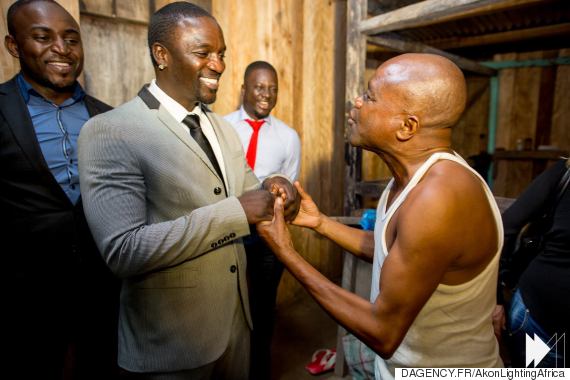Akon (Aliaune Damala Badara Thiam... that’s his real name) the famous rapper and singer in 2014 decided to give filling dance floors a break in favor of bringing solar energy to people living in rural Africa. The idea came when the researches showed that the continent averages 320 days of sunshine a year.
Akon has decided to seriously diversify and set up charity “Akon Lighting Africa” in 2014 which now has finally flourished.

A wide range of quality solar solutions, including street lamps, domestic and individual kits, have been installed in 14 African countries.
As a result, a number of households, villages, community houses, schools and health centres located in rural areas have been connected to electricity for the first time ever.
Local jobs, primarily for young people, have also been created in these communities, whether for installation of equipment’s or for maintenance.
So, now over 600 Million people can live in the light like the rest of the world thanks to Akon.
This is what some of the people affected had to say about Akon and his charitable work:
“Electricity is more than light. This is a true change in our daily life” – A mother, Yelimané, village, Mali
“Thanks to solar electricity we can now forget about kerosene, that is harmful and so expensive” – Inhabitant, Thiambokh Village, Senegal
“Now I can recharge my phone at home, I do not have to walk for hours or to pay for that” – Inhabitant, Village, Niger
It’s “a no-brainer.” That’s how hip-hop and R&B artist and producer Akon described using solar energy to bring power to hundreds of millions of Africans.
The Missouri-born Senegalese American had just trekked to Mali from an inaugural meeting in Côte d’Ivoire (Ivory Coast) with top West African leaders to talk about renewable energy solutions.
“Africa needs to be sustainable for a long time and be a crutch for the rest of world instead of the other way around,” Akon told ThinkProgress in a phone interview. “A stable Africa helps the world.”
Akon joined five prime ministers representing Benin, Ivory Coast, Mali, Niger, and Togo who gathered in the Ivory Coast’s economic capital of Abidjan for the West African Energy Leaders Group — a conference for business and political leaders working to develop strategies to address the region’s energy crisis.
“Because of the [lack of infrastructure] in Africa, we need more financial institutions to be a part of it, and partner with people who have a vision for Africa as well,” Akon said.
More than 1.3 billion Africans have no access to electricity; and only 5 percent living in sub-Saharan Africa have electricity.
Those staggering figures prompted the certified platinum recording artist to launch the Akon Lighting Africa (ALA) initiative in 2014, which aims to bring solar power to nearly half — 600 million — of the Africans who live without power.
So far, ALA has provided solar street lamps, micro-generators, charging stations, and home kits to 14 countries — Benin, Burkina Faso, Democratic Republic of the Congo, Equatorial Guinea, Gabon, Guinea, Kenya, Namibia, Madagascar, Mali, Niger, Nigeria, Senegal, and Sierra Leone.
The lack of power “stopped us from doing the things we need to do,” he said. “There wasn’t enough electricity to pull from,” to get Africa on par with the rest of the world developmentally, and solar was “the biggest and quickest solution.”
Global prices for solar modules have significantly dropped over the last decade, hitting a record low in 2014. ALA works with a $1 billion credit line from a Chinese solar system provider, allowing countries to pay back the debt over time.
“We want to empower the people to develop their own opportunities,” Akon said. “[But] before you empower people you have to educate them. So we developed the university,” which focuses on solar energy delivery and maintenance, “so they can [eventually] invent technology of their own.”
Instead of dropping technology on unsuspecting villages, ALA also teaches citizens how solar power works and how to install arrays through an educational training program called the Solar Academy.
“In every village we go to, we want to keep that village sustainable,” and promote entrepreneurship, Akon said. “The involvement of the rest of the world will be key. It will have to be started by Africans, but the technology the world has to offer has to be shared.”
The July meeting was the first of its kind, focusing on partnerships between private companies and state agencies. “There’s no way around: The government and investors are going to have to come together to work this out.”
Source:
http://thinkprogress.org/
Post a Comment